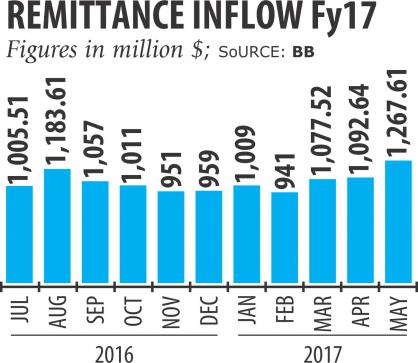The month of May saw the highest remittance inflow -- of $1.26 billion -- in 11 months, a spike that can be attributed to Eid-ul-Fitr, the biggest festival in the country.
Non-resident Bangladeshis tend to send more money home ahead of the Muslim holy month of Ramadan, which culminates in Eid-ul-Fitr. Ramadan began from May 28 in Bangladesh.
Last month's receipts bucked the negative trend since the beginning of the fiscal 2016-17: they were 4.37 percent higher than a year earlier.
May's receipts took the total remittance in the first 11 months of the fiscal year to $11.5 billion, down 14.18 percent year-on-year, according to data from the Bangladesh Bank.
Besides the seasonal factor, the BB took a host of initiatives to arrest the slow growth of remittance, which might have prompted the remitters to send money through the formal channel, said a central bank official.
The rising exchange rate might have also contributed to the jump in remittance, he added.
The inter-bank dollar rate crept up to Tk 80.50 in May from less than Tk 80 in April, according to data from the central bank.
The use of non-banking channel for sending remittance, slower manpower export and slowdown in global economy were mostly blamed for the downward trajectory of remittance for the past two fiscal years.
Remittance is the largest source of foreign exchange for Bangladesh after export receipts.
Overseas employment growth averaged 5.2 percent between 2010 and 2016, down from 5.8 percent in 2006-10, according to the Centre for Policy Dialogue.
In the proposed budget for upcoming fiscal year, the government has announced the establishment of a dedicated portal for migrant workers as part of the efforts to boost the remittance inflow.
From the portal, migrant workers will have easy access to work permit-related information of their host countries, while prospective ones can get visa-related particulars as well.
The government will also encourage the private sector to explore new labour markets and send workers abroad at low cost under state initiative.
The other measures include developing training infrastructure and imparting training to migrant workers to better meet the job requirements of their host countries.
Finance Minister AMA Muhith in his budget speech said remittance inflow may rise in the upcoming fiscal year thanks to the various government initiatives and continued recovery of the global economy.
As of now, the government has brought down the cost of remittance transfer and improved the efficiency of overseas banking units and exchange houses to bump up the inflows to Bangladesh, he said.
A step was also taken to strengthen drawing arrangement between Bangladeshi banks and the local banks of the countries where expatriates are working and to motivate the workers to remit through Probashi Kallyan Bank (Expatriates Welfare Bank).
“I firmly believe that all these initiatives together with the increasing trend of global growth will have a positive impact on our remittance inflows,” Muhith said in his budget speech.
news:daily star/5-jun-2017




Comments